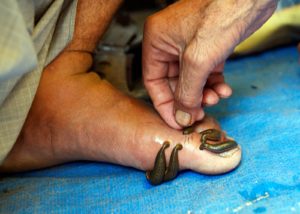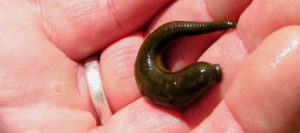Hirudotherapy or leech therapy locally known ÔÇ£Derkhe IllaajÔÇØ is one of the oldest complementary therapies, employed by KashmirÔÇÖs for treating various ailments like skin diseases, arthritis, chronic headaches, frostbite and sinusitis. The concept of leech therapy has come to Kashmir from Egypt as early as 500 BC, when they were used to treat diseases like gout and nosebleeds.

On 21 March, when Novroz is celebrated in many parts of the world, Kashmiris go for new life with the course of leech therapy or Hirudotherapy. Many people think attaching live leeches to the human body can cure chronic diseases.
ÔÇ£I was diagnosed with sinusitis last year, I tried every clinical medicine as prescribed by doctors but there was no improvement. My grandfather brought me here for leech therapy and today is my second visit, I really can feel the difference in my health.ÔÇØ Says Maliha ,while taking leech therapy
Leeches, extensively used by medical professionals to promote bloodletting in the past, are making a comeback in Jammu and Kashmir to heal a number of diseases, attracting patients from all over India. TodayÔÇÖs Leech therapy is safe and different from ancient one as wild leeches are not employed anymore. There are around 650 species of leeches described in the world and only 15 are classified as medicinal leeches. During past leech therapy was limited to shrines only but now this trend has been introduced to the hospitals as well, there are six hospitals in Kashmir that have started using leeches on patients suffering from various diseases.

“We have been using leeches for the past four years and the results are encouraging, more and more patients are visiting us.” said Munir Ahmad, who practices Unani “Leeches are wonder-doctors. The saliva of leeches contains many bio-active substances which enter the body of a patient while leeches suck blood,”
How leeches help in Curing disease:
Leeches are gifted by nature with a capacity to ingest an amount of blood approaching 10 times their own weight and may not require feeding for up to 1 year after their last meal. The saliva of medicinal leeches is commonly used in hirudotherapy that contains more than 100 bio active substances like hirudin, hyaluronidase, calin, destabilise, Eglin and bdellin with various beneficial properties like therapeutic, anticoagulant, vasodilatory, thrombolytic, anti-inflammatory and anaesthetic. The most important therapeutic substance produced by the leeches is hirudin, well-known for its antithrombotic properties. In addition, leeches are rewarded by the nature with anti-cancerous properties and some important neurotransmitters like dopamine, serotonin, acetylcholine, and enkephalin are produced by leeches, which lend a hand in the reduction of the perception of pain by the patients along with a relaxation effect.
How leech therapy /Hirudotherapy works?
 Medicinal leeches have three jaws with tiny rows of teeth. They pierce a personÔÇÖs skin with their teeth and insert anticoagulants through their saliva.
Medicinal leeches have three jaws with tiny rows of teeth. They pierce a personÔÇÖs skin with their teeth and insert anticoagulants through their saliva.
The leeches are then allowed to extract blood, for 20 to 45 minutes at a time, from the person undergoing treatment. This equates to a relatively small amount of blood, up to 15 millilitres per leech and it is believed they only suck impure blood from the body which is responsible for chronic diseases. During a session, live leeches attach themselves to the target area and draw blood. They release the proteins and peptides that thin blood and prevent clotting. This improves circulation and prevents tissue death. The leeches leave behind small, Y-shaped wounds that usually heal without leaving a scar.
Diseases which leech therapy can treat :
- Skin Diseases (eczema, seborrhea, skin manifestations of vascular diseases, trophic ulcer);
- Eye diseases (inflammatory diseases of the eyelids, cornea, sclera, conjunctivitis, accommodation spasm, degenerative-dystrophic and inflammatory diseases of the media and eye membranes; optic neuritis; edematous exophthalmos, corneal erosion, keratitis, inflammation of the vascular tract, glaucoma (especially acute attacks) ;
- ENT diseases (acute neuritis of the auditory nerve, ear noises chronic neuritis, acute rhinitis, acute sinusitis; forunkulez outer ear, acute laryngotracheitis, acute outer (middle) otitis media, chronic adhesive otitis media, the state after radical surgery strednem ear, chronic suppurative otitis media (mezoepitimpanit) granulation post-operative intervention on the middle ear, nasal bleeding);
- Respiratory diseases (influenza, acute respiratory infection, herpetic lesions of the nose, lips, and others.);
- Diseases of the gastrointestinal tract (gastritis, stomach ulcers, colitis, dyskinesia zhelochnom-deducing ways; stagnation in the liver and gallbladder, liver and Quiroz etc.)
- Vascular disease (hypertension, hypotension, varicose veins, post-surgical thrombosis, thrombophlebitis, endarteritis, haemorrhoids);
- Gynecological diseases (infertility, adhesions pelvic organs, chronic adnexitis, salpingo-oophoritis, acute inflammation of the appendages; parametritis, postpartum endometritis, mastitis, adenomyosis, uterine body, endometriosis, uterine fibroids, bartholinitis; colpitis, genital herpes, ovarian cysts, cervical erosion uterine appendiceal infiltrate);
8- Diseases of the musculoskeletal system (osteochondrosis, arthritis, bone fractures, chronic osteometric et al.);
- Metabolic diseases (diabetes, as insulin and neinsulinozavisimy);
- Dental disease (periodontal disease, gingivitis, neuralgia glossopharyngeal nerve; trigeminal neuralgia, trigeminal neuropathy, abscess and others.);
 Side effects of Leech therapy:
 There are very low chances of side effects from leech therapy; however, there are some risks of bacterial infection. One has to be very much cautious during this therapy as if something goes wrong, blood will ooze out of the area that has been treated and the site of the leech bite will not close. Even sometimes leeches will try to move to another area of the body where you do not need treatment, causing unnecessary blood loss. During treatment, if you will discover your allergy towards leech saliva, it is advisable to stop your treatment as soon as possible because you will be no longer a suitable candidate for this treatment method.
There are very low chances of side effects from leech therapy; however, there are some risks of bacterial infection. One has to be very much cautious during this therapy as if something goes wrong, blood will ooze out of the area that has been treated and the site of the leech bite will not close. Even sometimes leeches will try to move to another area of the body where you do not need treatment, causing unnecessary blood loss. During treatment, if you will discover your allergy towards leech saliva, it is advisable to stop your treatment as soon as possible because you will be no longer a suitable candidate for this treatment method.


Amazing!
Thanks. Keep reading.